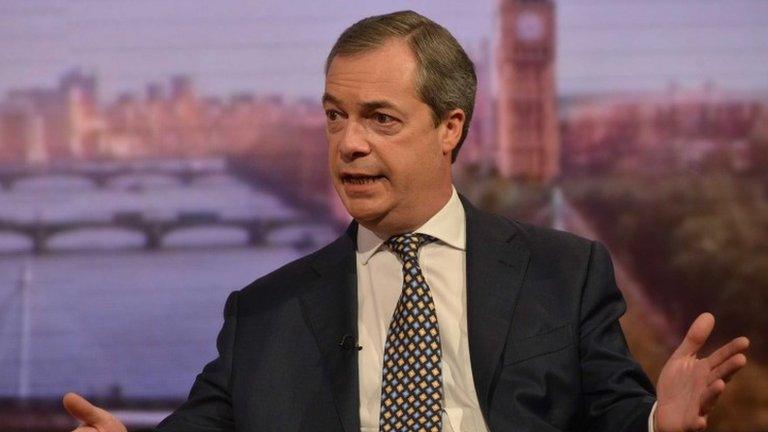Cameron: Clegg and Farage on 'extremes' of EU debate
- Published
Nigel Farage and Nick Clegg make their opening statements
Prime Minister David Cameron has accused his deputy Nick Clegg and UKIP leader Nigel Farage of holding "quite extreme" views on Europe following their BBC TV debate on the issue.
The two men became involved in a personal row during Wednesday's event, accusing each other of misleading the public over EU powers.
Lib Dem leader Mr Clegg said he was on a mission to reverse "myth-making".
Mr Farage said his rival had "gone for me" rather than dealing with issues.
During the bad-tempered hour-long debate, Mr Farage accused Europhile Mr Clegg of "wilfully lying" over Brussels' powers over the UK, while Mr Clegg claimed the UKIP leader was peddling "dangerous fantasies".
Opinion polls suggest Mr Farage, who wants the UK to leave the EU, was more successful in persuading viewers of his case.
'Both wrong'
Asked on BBC Breakfast whether "his man", Mr Clegg, had won, Mr Cameron replied: "I didn't have a dog in the fight, as it were."
The prime minister summarised the debate by saying: "Nick thinks there's nothing wrong with Europe and we shouldn't have a referendum, and Nigel thinks there's nothing right with Europe and we should just get out and leave. They're both wrong."
David Cameron said both Nick Clegg and Nigel Farage have ''quite extreme views'' on Europe
Mr Cameron has said he will renegotiate the UK's relationship with the EU before holding an in/out referendum in 2017, if the Conservatives win the next general election.
"That's what Britain needs and it's what people want: a proper choice but real change in Europe and that's what these European elections should be about," he said.
'Battle joined'
He said Mr Farage did not "recognise the fact that we've got to trade and compete in Europe".
"The problem with the UKIP view is it's sort of: 'Stop the world, I want to get off, Britain can't succeed.' It's deeply pessimistic. I'm very optimistic," Mr Cameron added.
The BBC debate was the second Farage-Clegg confrontation to be held in as many weeks.
YouGov's snap poll gave it to Mr Farage by 68% to 27%, while a poll by ICM/Guardian found 69% of people watching thought the UKIP man had come out on top.
On BBC Radio 2's Jeremy Vine Show, Mr Clegg said he did not feel damaged by this verdict, adding: "I'm delighted we had the debate. I would do it every day of the week if people were up for it."
He added that he intended to overcome "20 years of myth-making" about the EU, insisting: "It's a marathon, not a sprint. This debate is going to continue."
The deputy prime minister said it was "extraordinary" that Mr Cameron and Labour leader Ed Miliband had declined to take part.
'Sid Vicious'
During the debate, Mr Farage distanced himself from Mr Clegg and other "career politicians", who he said were too willing to accept orders from Brussels.
But, on Jeremy Vine, Mr Clegg said that, like himself, Mr Farage had attended an "expensive" London school and had been a member of the European Parliament since 1999, making him a career politician.
He said: "He must explain why that kind of background makes him some kind of Sid Vicious character."
Appearing on the same programme, Mr Farage responded: "I spent 20 years in business. I've lived and breathed and worked in the real world and there's almost nobody left in frontline politics with that experience of the commercial world."
He also criticised his opponent's debating style, saying: "Nick Clegg made the mistake that career politicians have been making over the last few years. He decided, rather than dealing with the issues, to go for me and to go for UKIP's ideology, to paint us out as somehow to be mad, ranting conspiracy theorists, when all we want to do is govern our own country.
"That line of argument by Clegg turned people against him."
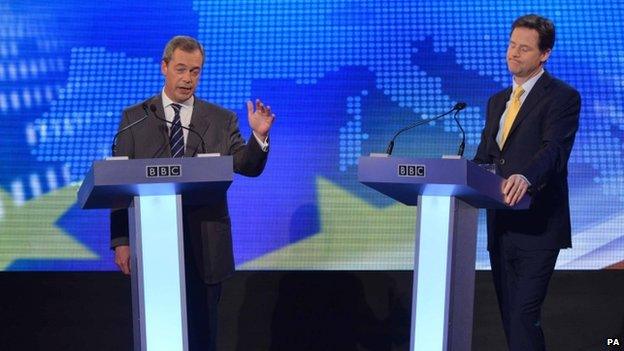
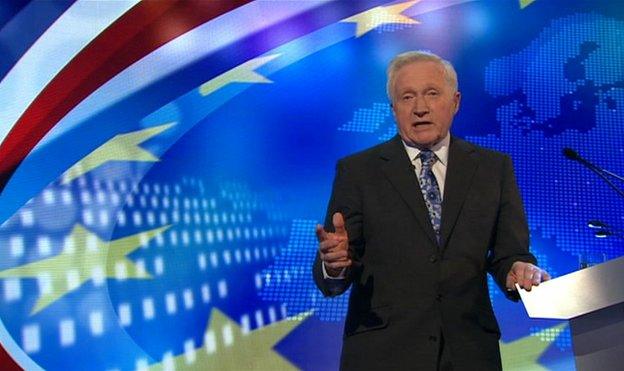
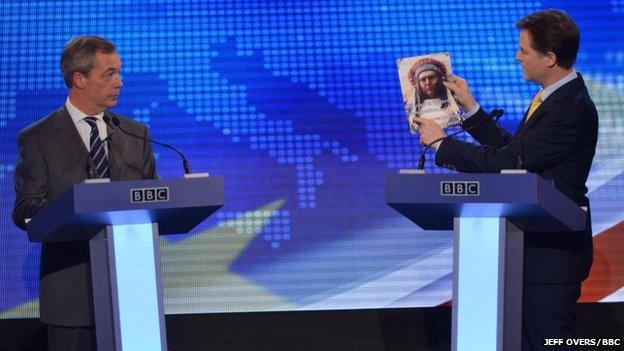
Mr Clegg kicked off Wednesday's debate - hosted by David Dimbleby - by accusing his opponent of foisting a "dangerous con" on the public by arguing for Britain's exit from the EU, telling the audience in the BBC's radio theatre that "if it sounds too good to be true, it is".
Mr Farage said he did not want Britain to be part of an "expansionist" EU foreign policy, claiming that the EU wants its own "army and navy".
The pair traded verbal blows over the percentage of British laws made in Brussels and argued over the effects of immigration.
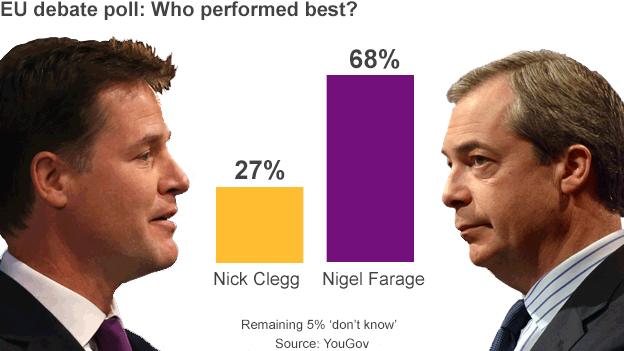
Towards the end of the debate, the UKIP leader issued a warning about the rise of far-right parties in Europe, saying: "I want the EU to end but I want it to end democratically. If it doesn't end democratically I'm afraid it will end very unpleasantly."
He used his closing statement to make a pitch for votes in May's European elections, saying: "I would urge people - come and join the people's army. Let's topple the establishment who got us into this mess."
Mr Clegg, in his closing remarks, promised "real remedies for the way the world is today, not dangerous fantasies about a bygone world that no longer exists
"And that is why I'm going to do everything I can to make sure that we remain part of the European Union because that is how we protect the Britain we love."
Speaking on BBC One's Question Time, Lib Dem Business Secretary Vince Cable said: "Farage, to give him credit, is a very effective, if demagogic, debater."
He also said Mr Clegg deserved "a lot of credit for showing the bottle to go out and debate".
The SNP said it believed in "positive engagement" with the EU and an independent Scotland would have "a seat at the top table in Europe".
Plaid Cymru said it wanted a "strong voice" for Wales in Brussels and it was concerned that Wales could be "pulled out of the EU against its own will and its own interests".
- Published3 April 2014
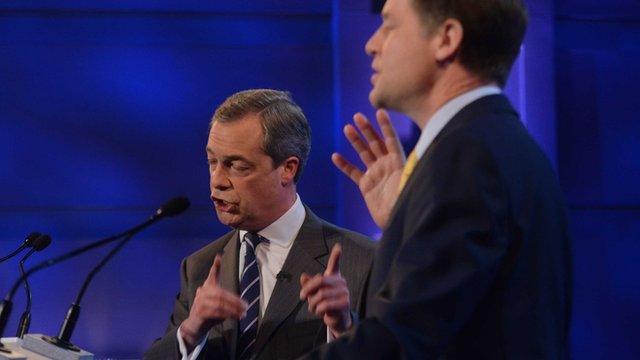
- Published3 April 2014
- Published3 April 2014
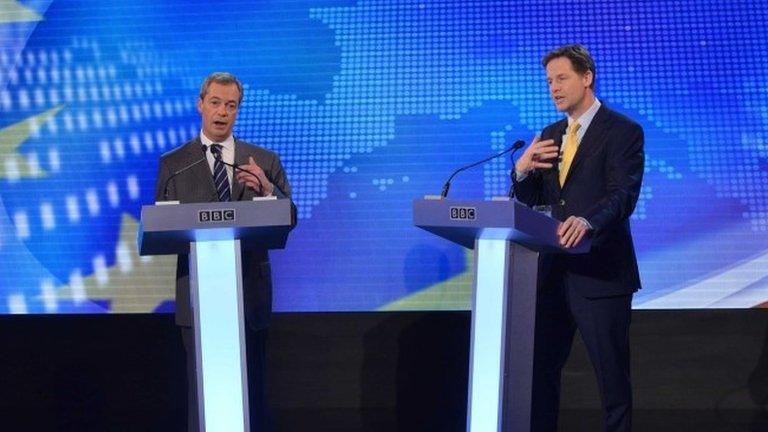
- Published2 April 2014
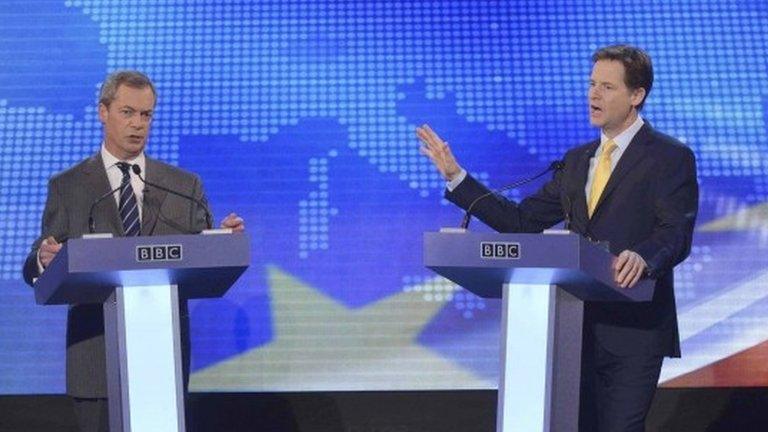
- Published2 April 2014
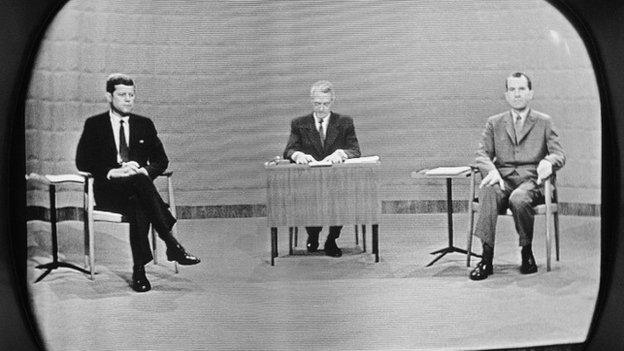
- Published2 April 2014
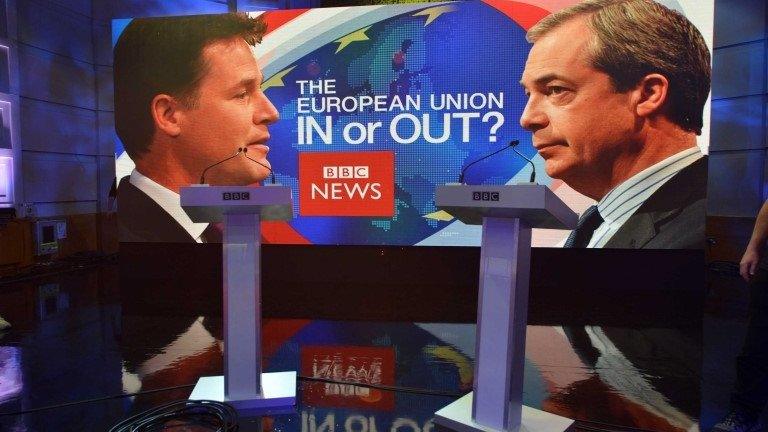
- Published31 March 2014
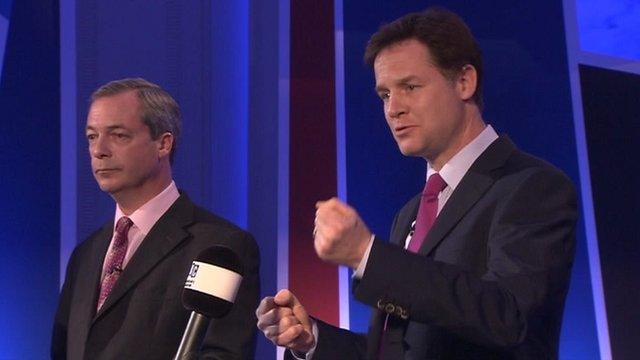
- Published27 March 2014
